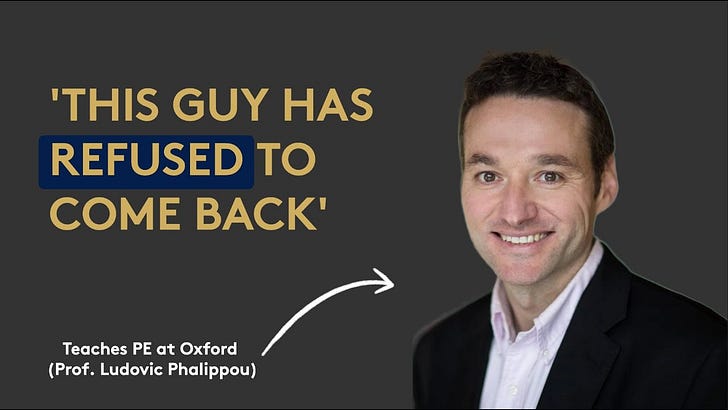My best friend in high school could mingle with everyone in a teenage environment where little groups would form and rarely mix. I was less social, more judgemental, but I admired his ability, and I asked how he managed to hang out with so and so. And I still remember his answer:
“If you take them in the second degree, even a**holes are fun.”
I will leave this deep quote open to your interpretation, but I see Matt Levine, the GOAT of investment newsletters, as a practitioner of this philosophy. He often talks about frauds, dodgy deals, and immoral but legal practices with a humorous lens and looks at it from both sides.
If you’re not familiar with his work, I highly recommend subscribing, but here’s a copy-paste from one of his posts on KKR vs. the Justice Department to show what I mean about ‘both sides’:
If I were KKR’s co-CEOs, I would never agree to that! It’s not like they are filling out the forms; why should they be liable if some of their underlings fill out the forms wrong?
I get why the Justice Department wants it? The point of the settlement is to make KKR fill out the forms right, and threatening the CEOs with personal liability is a way to get KKR to take the forms seriously.
The original idea behind the InvestOrama content platform was to be a guide to “the future of investing but without the hype.” Over time, I discovered much more hype than I expected initially. I went from enthusiasm to doubt and criticism of the “democratization” of options, alternatives, private markets, etc.
In many of my recent videos, podcasts, etc., I’ve been judgemental or critical of investment platforms, products, funds, industry practices, and companies.
I don’t regret it a single bit of it. I think there needs to be more counterweights to the dominant narratives, and we need the empowerment of investors over the democratization of assets.
I was even tempted by an overtly critical approach to the investment management industry, similar to what Disconnect does with big tech. But, as it turns out, this is not for me. I remain optimistic overall, and I’m fascinated by the industry because a) it’s important, b) it’s fun and c) I’m not going to ’solve’ it anyway
I wasn’t actively searching for a new approach, but I serendipitously came across a couple of books:
A Skeptic’s Guide to the Future:
A high-tech roadmap of the future in their beloved voice, cracking open the follies of futurists past and how technology will profoundly change our world, redefining what it means to be human.
The authors “apply their trademark skepticism, to extrapolate upon each scientific development, leaving no stone unturned as they lay out a vision for the future.”
How Stories, Statistics and Studies Exploit Our Biases - And What We Can Do About It
A Professor of Finance wrote this book, but his examples are from other industries:
Our lives are minefields of misinformation. It ripples through our social media feeds, our daily headlines, and the pronouncements of politicians, business leaders, and best-selling authors. Stories, statistics, and studies are everywhere, allowing people to find evidence to support whatever position they want. Many of these sources are flawed, yet by playing on our emotions and preying on our biases, they can gain widespread acceptance, warp our views, and distort our decisions.
The combination of those and other influences has prompted me to take a new approach: sceptic, not critic!
This triggered a review of my content. The main change is I’m resurrecting my Fintech Files podcast about how tech will impact how we build wealth and move money. For now, I’ve just dumped the archive on YouTube, but I’m lining up exciting guests
It will sit in parallel to the podcast where I interview authors and experts, which is now called The Skeptic’s Guide to Investment Management (S.G.I.M.).
With Industry Season 3 becoming available in the UK, I’ve posted some new analysis on the InvestOrama YouTube channel. It is almost at 20K subs, so please help me cross the line by subscribing!
In this newsletter, you can expect a curation of all of the above + I’m adding some evergreen resources at the bottom.
Recent publications
Educational resources for investors
A curation of Alternative Investment startups
Alternative Investment courses
Tools (affiliate links)
Descript: for editing videos, podcasts, and using them as the foundations for articles
Wise: for paying in different currencies and earning on cash balances
Podcasting & Marketing
Orama (my business): helps brands grow with podcasts


